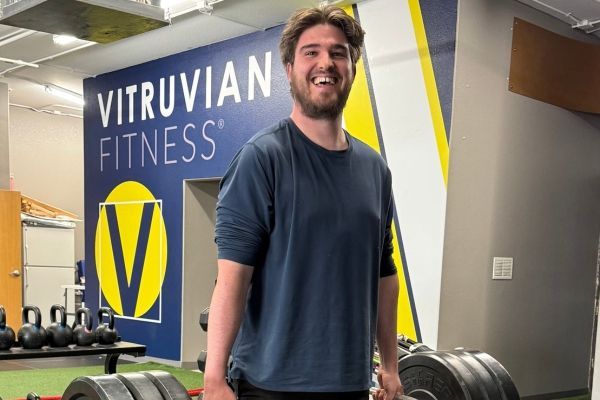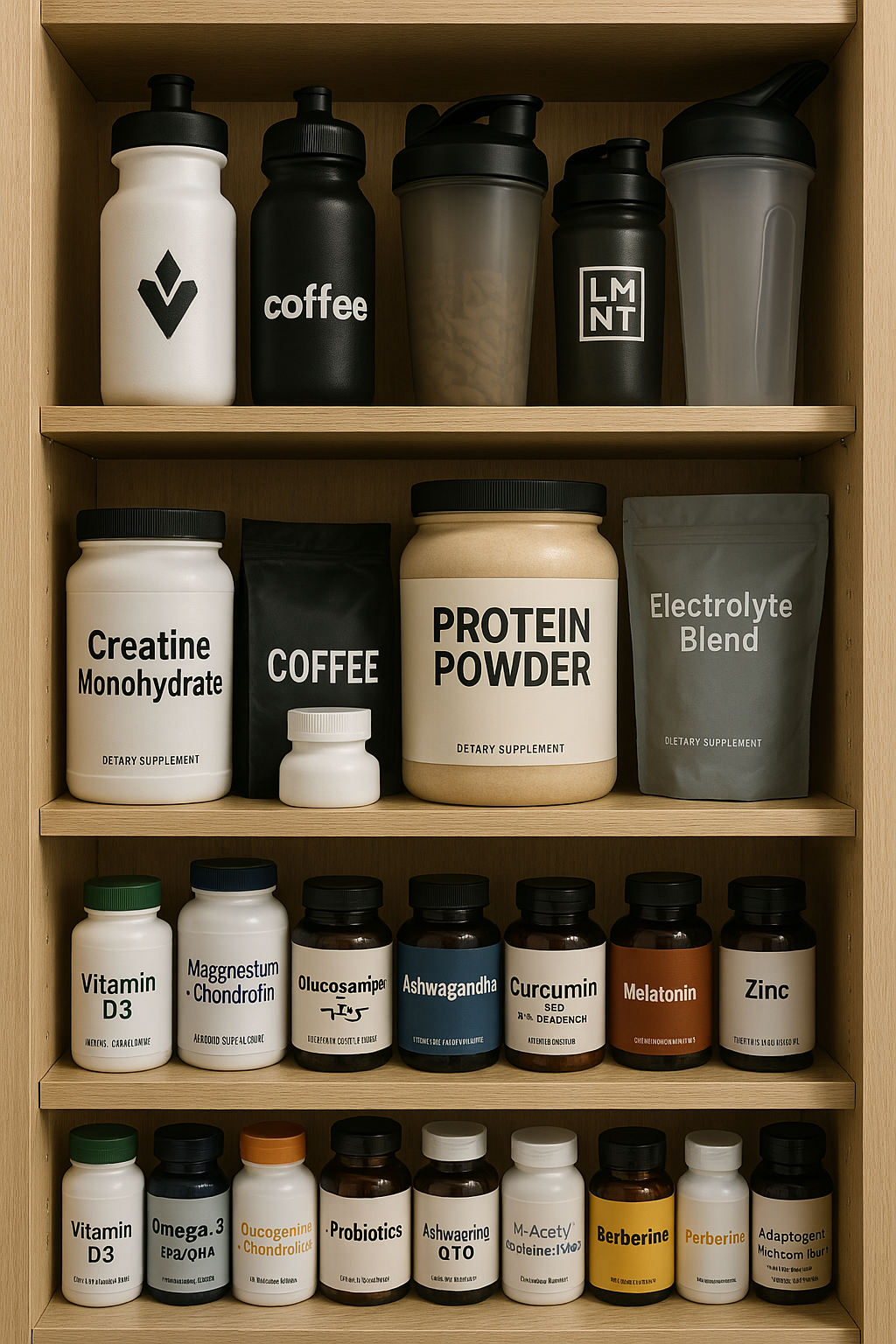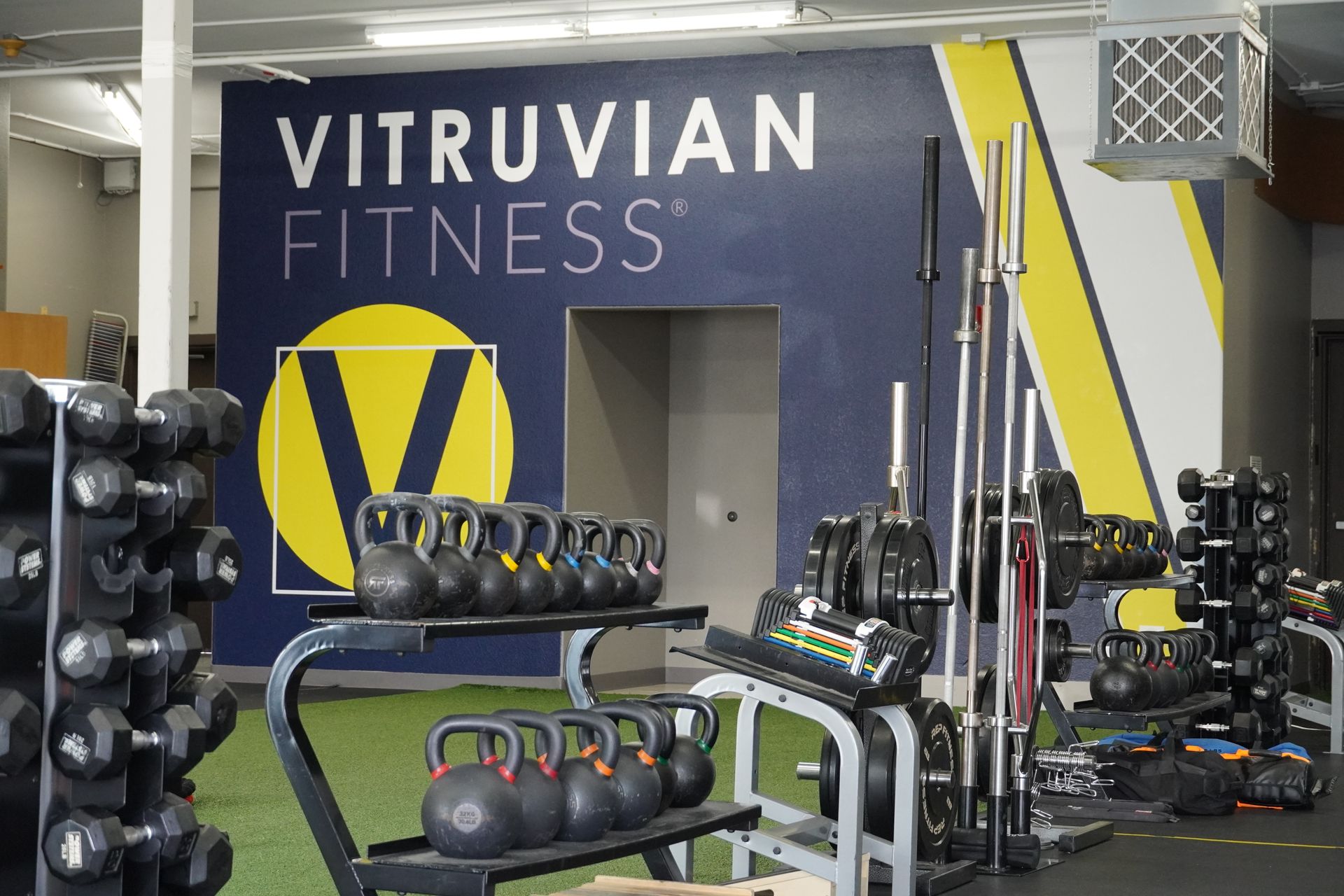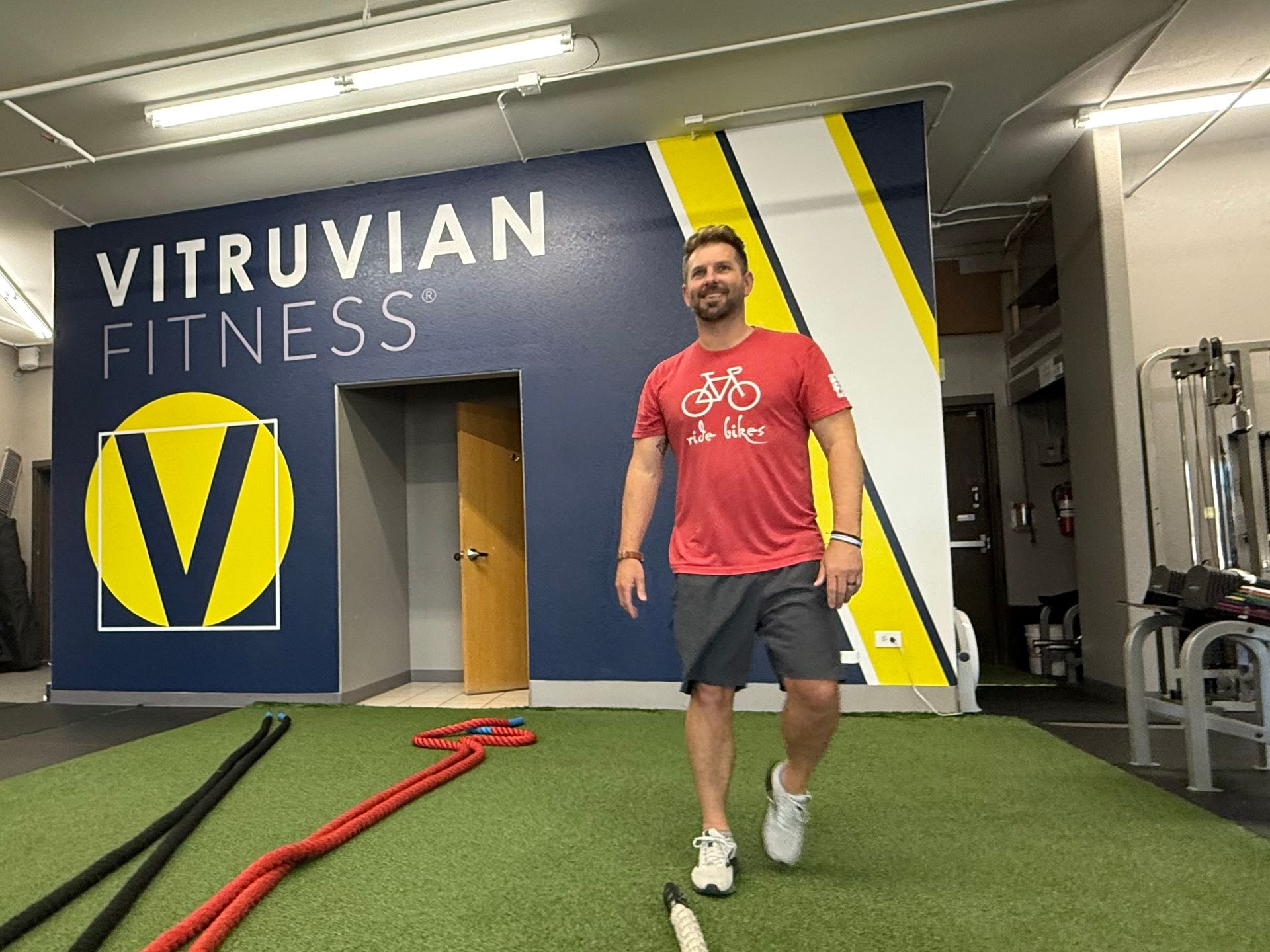Our Top 20 Supplement Recommendations - IF You Should Take Any At All
Supplements can be useful. Sometimes they’re even necessary. But figuring out if, when, and why you should use them is a more complicated question than most headlines, influencers, or supplement companies want to admit. In a perfect world, we’d get all the micronutrients, minerals, and performance-optimizing compounds we need from real food, sunlight, sleep, and clean living. In the real world, though, where stress is high, schedules are full, and food quality varies, strategic supplementation can fill gaps, enhance recovery, improve long-term health, or support performance. Maybe.
But here’s the problem: the supplement space is a minefield. Outdated “bro science,” influencer hype, fairy-tale claims, and straight-up lies have created a noisy mess that makes choosing the right supplement, if you even need one, much harder than it should be. And remember: no two bodies are exactly alike. Your age, gender, activity level, medical history, diet, goals, and lifestyle all influence what your body might be missing (or absorbing poorly). Supplementation isn’t a one-size-fits-all solution. A supplementation strategy should begin with lab work, conversations with qualified professionals, and clear priorities.
Disclaimer:
This guide is not medical advice or a prescription. It’s an information tool designed to help you better understand what supplements may or may not support your personal health, performance, or longevity goals. Before starting any new supplement, consult with a qualified healthcare or functional nutrition professional, especially if you have preexisting conditions, take medications, or are managing complex health goals.
Top 20 Supplements Ranked for Longevity, Aging, Recovery, and Athletic Performance
Introduction
This ranked list attempts to prioritize supplements based on their value for longevity, healthy aging, recovery, and athletic performance—in that order. If your priorities are different, the ranking of these supplements might change or look quite different.
Each supplement is evaluated using scientific literature (not market hype), considering:
🔹 Primary Use
✅ Pros & ⚠️ Cons
🧬 Best and 🚫 Worst users
♀/♂Gender-specific nuance, where relevant
⚔️ Conflicting evidence, if applicable
🔬Highly cited references
Supplements popular due to marketing or legacy use (like glucosamine or fat burners) were either demoted or excluded. This list is intended to educate consumers who want to age well, recover intelligently, and train sustainably.
Here's Our List of the Top 20
1. Vitamin D3 (Cholecalciferol)
🔹 Use: Bone health, immune regulation, mood, aging support
✅ Pros: Easy to supplement, addresses widespread deficiency, supports immunity and calcium absorption
⚠️ Cons: Requires blood testing; fat-soluble, so toxicity risk exists with long-term high doses
🧬 Best for: Indoor workers, older adults, darker-skinned individuals, northern climates
🚫 Worst for: Individuals already getting excess D3 from multiple sources without lab monitoring
♀/♂: Especially crucial for post-menopausal women (bone health)
🔬 Reference: Holick MF (2007).
NEJM.
2. Omega-3s (EPA/DHA)
🔹 Use: Cardiovascular and brain health, inflammation reduction
✅ Pros: Supports cognitive aging, cardiovascular function, and joint recovery
⚠️ Cons: Quality varies; risk of oxidation; fishy burps for some
🧬 Best for: Anyone not eating fatty fish 2–3x/week, inflammatory issues
🚫 Worst for: People on anticoagulants or poor-quality supplement users
♀/♂: Women may convert ALA more efficiently but still benefit from direct EPA/DHA
🔬 Reference: Mozaffarian D, Wu JHY (2011).
J Am Coll Cardiol.
https://www.sciencedirect.com/science/article/pii/S0735109711031317
3. Magnesium (Glycinate or Citrate)
🔹 Use: Sleep, muscle and nerve function, blood pressure, mood
✅ Pros: Involved in 300+ enzyme processes; helps sleep, stress, and metabolic health
⚠️ Cons: Citrate may cause loose stools; many forms are poorly absorbed
🧬 Best for: Stressed individuals, poor sleepers, older adults
🚫 Worst for: Over-supplementers or multivitamin users
♀/♂: Women benefit during menstruation and menopause-related insomnia
🔬 Reference: de Baaij JHF et al. (2015). Physiol Rev.
https://journals.physiology.org/doi/full/10.1152/physrev.00012.2014
4. Creatine Monohydrate
🔹 Use: Strength, cognition, lean mass preservation
✅ Pros: Neuroprotective, improves performance, supports muscle and possibly brain aging
⚠️ Cons: Water retention; occasional GI issues
🧬 Best for: Older adults, lifters, vegetarians
🚫 Worst for: Kidney disease (precautionary)
♀/♂: Especially helpful post-menopause for strength and cognitive support
🔬 Reference: Kreider et al. (2017). JISSN.
https://www.tandfonline.com/doi/full/10.1186/s12970-017-0173-z#abstract
5. Protein Powder (Whey, Casein, or Plant-Based)
🔹 Use: Muscle maintenance, recovery, sarcopenia prevention
✅ Pros: Convenient, efficient way to hit protein targets; important with aging
⚠️ Cons: Varies in quality; may replace food if overused
🧬 Best for: Aging adults, athletes, low appetite individuals
🚫 Worst for: Already protein-replete individuals
♀/♂: Women often under-consume protein; more likely to benefit from protein shakes
🔬 Reference: Morton RW et al. (2018). Br J Sports Med.
https://bjsm.bmj.com/content/52/6/376
6. Collagen Peptides
🔹 Use: Joint support, skin elasticity, connective tissue resilience
✅ Pros: Some support for aging skin and tendon integrity
⚠️ Cons: Not a complete protein; effectiveness varies by formula
🧬 Best for: Aging joints, connective tissue support
🚫 Worst for: Used as a primary protein source
🔬 Many studies lean toward support of its efficacy while stating more research required.
References:
Heliyon. 2023 Mar https://pmc.ncbi.nlm.nih.gov/articles/PMC10102402/
Clark et al. (2008). CMRO.
https://www.tandfonline.com/doi/abs/10.1185/030079908X291967
7. Electrolyte Blends (Sodium, Potassium, Magnesium)
🔹 Use: Hydration, blood pressure, muscle cramp prevention
✅ Pros: Especially valuable for older adults or keto diets
⚠️ Cons: Can raise BP if overused
🧬 Best for: Older adults, low-carb dieters, heavy sweaters
🚫 Worst for: Hypertension or kidney disease
♀/♂: Magnesium helpful for PMS-related cramps
🔬
Wing Yin Lau, Haruyasu Kato, Kazunori Nosaka - BMJ Open Sport
& Exercise Medicine 2019;5:e000478.
8. CoQ10 (Ubiquinol)
🔹 Use: Energy production, cardiovascular health, statin fatigue mitigation
✅ Pros: Supports mitochondrial aging; fatigue reduction
⚠️ Cons: Requires bioavailable form; expensive
🧬 Best for: Statin users, chronic fatigue, aging adults
🚫 Worst for: Young, healthy individuals with high natural CoQ10
🔬
Littarru GP, Tiano L. Clinical aspects of coenzyme Q10: an update. Nutrition. 2010;26(3):250–254.
https://pubmed.ncbi.nlm.nih.gov/19932599/
9. Curcumin (with Piperine)
🔹 Use: Anti-inflammatory, cognitive health, joint support
✅ Pros: Natural COX-2 inhibitor; supports longevity, brain aging
⚠️ Cons: Low bioavailability unless paired with absorption enhancers
🧬 Best for: Inflammation, cognitive longevity, recovery
🚫 Worst for: Those on anticoagulants
🔬 Reference: Hewlings & Kalman (2017). Foods.
10. Probiotics
🔹 Use: Gut health, digestion, immunity
✅ Pros: Some strains help restore gut microbiome, reduce inflammation
⚠️ Cons: Strain-specific; not universally helpful
🧬 Best for: Post-antibiotic use, GI issues
🚫 Worst for: Immune-compromised individuals or those with healthy guts
🔬 Reference: NIH Fact Sheet for Consumers - Probiotics
https://ods.od.nih.gov/factsheets/Probiotics-Consumer/
11. Iron (if deficient)
🔹 Use: Energy, cognitive function, oxygen transport
✅ Pros: Treats anemia, boosts performance if deficient
⚠️ Cons: Toxic if overused; causes constipation
🧬 Best for: Menstruating women, vegans, endurance athletes
🚫 Worst for: Men or post-menopausal women without deficiency
♀/♂: Women are significantly more likely to benefit
🔬 Reference: Haas & Brownlie (2001). Nutr Rev.
https://pubmed.ncbi.nlm.nih.gov/11160598/
12. Melatonin
🔹 Use: Sleep onset, circadian alignment
✅ Pros: Effective for circadian disruption, travel, or shift work
⚠️ Cons: Not a sedative; excessive use disrupts sleep architecture
🧬 Best for: Older adults, jet-lagged or shift workers
🚫 Worst for: People with depressive tendencies or on SSRIs
♀/♂: Women may metabolize melatonin slower
🔬 Reference: Zisapel, N. (2018). British Journal of Pharmacology
13. Zinc
🔹 Use: Immune and hormone support
✅ Pros: Supports testosterone, immune resilience, antioxidant status
⚠️ Cons: Can deplete copper; avoid long-term high doses
🧬 Best for: Immunocompromised, older men with low testosterone
🚫 Worst for: People already taking zinc-rich multis or diets high in red meat
♀/♂: Men benefit hormonally; women require less
🔬 Reference: Haase, H., & Rink, L. (2014). Zinc signals and immune function. BioFactors, 40(1), 27–40.
14. N-Acetyl Cysteine (NAC)
🔹 Use: Liver support, respiratory and antioxidant function
✅ Pros: Precursor to glutathione; helps detox, protects lungs
⚠️ Cons: Can interact with meds; sulfur taste/smell
🧬 Best for: Smokers, polluted areas, high oxidative stress
🚫 Worst for: Pregnant or medicated individuals without guidance
🔬 Reference: Mokhtari V, Afsharian P, Shahhoseini M, Kalantar SM, Moini A.
https://pmc.ncbi.nlm.nih.gov/articles/PMC5241507/
15. Berberine
🔹 Use: Glucose regulation, insulin sensitivity
✅ Pros: Comparable to metformin in effect; supports metabolic health
⚠️ Cons: GI side effects; drug interactions
🧬 Best for: Pre-diabetic, PCOS, high triglycerides
🚫 Worst for: People on multiple prescriptions
🔬 Reference: Yin et al. (2008). Metabolism.
16. Adaptogenic Mushrooms (Lion’s Mane, Reishi, Cordyceps)
🔹 Use: Cognitive resilience, immune modulation
✅ Pros: Emerging evidence for neuroprotection, fatigue reduction
⚠️ Cons: Sparse high-quality human studies; effects strain-dependent
🧬 Best for: Stress recovery, brain fog, immune function
🚫 Worst for: Expecting drug-level efficacy or taking immunosuppressants
🔬 Reference: Mori, K., Inatomi, S., Ouchi, K., Azumi, Y., & Tuchida, T. (2009).
https://onlinelibrary.wiley.com/doi/10.1002/ptr.2634
17. Caffeine
🔹 Use: Energy, alertness, performance boost
✅ Pros: Enhances exercise output, mood, and focus
⚠️ Cons: Tolerance, dependence, disrupts sleep and recovery
🧬 Best for: Morning exercisers, endurance athletes
🚫 Worst for: Insomniacs, high-stress individuals
♀/♂: Women clear caffeine more slowly, especially on oral contraceptives
🔬 Reference: Cappelletti S, Piacentino D, Sani G, Aromatario M. Curr Neuropharmacol. 2015
https://pmc.ncbi.nlm.nih.gov/articles/PMC4462044/
18. Fiber - Specifically Psyllium Husk
🔹 Use: Gut health, cholesterol, satiety, glucose control
✅ Pros: Supports gut microbiome, blood sugar, and fullness, regularity
🧬 Best for: Adults with poor digestion, low fiber diet
🔬 Reference: Lambeau KV, McRorie JW Jr. 2017 Mar 2
19. Ashwagandha (Withania somnifera)
🔹 Use: Stress adaptation, cortisol regulation
✅ Pros: Improves HRV, sleep, strength recovery
⚠️ Cons: Can interfere with thyroid meds or autoimmune issues. Results not significantly different than placebo groups.
🧬 Best for: Overworked, anxious, under-recovered individuals
🚫 Worst for: Thyroid or autoimmune conditions without supervision
🔬 Reference: Smith SJ, Lopresti AL, Fairchild TJ. 2023 Nov
https://pubmed.ncbi.nlm.nih.gov/37740662/
Wankhede et al. (2015). JISSN.
https://www.tandfonline.com/doi/full/10.1186/s12970-015-0104-9#abstract
20. Multivitamins (High-Quality, Targeted)
🔹 Use: Nutrient insurance policy
✅ Pros: May cover minor gaps in micronutrient intake
⚠️ Cons: Often underdosed, low quality, not individualized
🧬 Best for: Restricted diets, older adults with low food variety
🚫 Worst for: Over-reliance without dietary changes
♀/♂: Choose gender/age-specific formulas (iron for women, etc.)
🔬 Reference: Ames BN (2006). PNAS.
https://www.pnas.org/doi/full/10.1073/pnas.0608757103
🚫 Not Worth It: Overrated Supplements
These commonly marketed supplements either lack strong evidence of benefit, are redundant, or may even pose risks. They don’t make the top 20 and generally aren’t worth your money or your hope.
1. Glucosamine + Chondroitin
🧩
Claim: Joint repair and cartilage protection
❌
Verdict: Multiple large studies show minimal to no benefit beyond placebo. Any mild effect is likely anecdotal or driven by industry bias.
🔬
Reference: Clegg et al. (2006).
NEJM.
https://doi.org/10.1056/NEJMoa052771
2. Branched Chain Amino Acids (BCAAs)
🧩
Claim: Boosts recovery and muscle growth
❌
Verdict: If you consume adequate total protein, BCAAs offer no additional benefit and are a waste of money.
🔬
Reference: Wolfe RR (2017).
JISSN.
https://doi.org/10.1186/s12970-017-0184-9
3. Testosterone Boosters (Tribulus, Fenugreek, etc.)
🧩 Claim: Raise testosterone naturally and build muscle
❌ Verdict: Strong placebo effect but little measurable improvement in T levels or performance in healthy men.
🔬 Reference: Clemesha CG, Thaker H, Samplaski MK. World J Mens Health. 2020 https://pmc.ncbi.nlm.nih.gov/articles/PMC6920068/
4. Fat Burners / Thermogenics
🧩 Claim: Accelerate fat loss and metabolism
❌ Verdict: At best, slightly raise energy expenditure; at worst, are stimulant-loaded and potentially dangerous.
🔬 Reference: Clark JE, Welch S. Nutr Health. 2021
https://pmc.ncbi.nlm.nih.gov/articles/PMC9987759/
Final Thoughts: Personalization Is the Key
The best supplement plan isn’t the one with the most bottles—it’s the one that matches your physiology, lifestyle, and goals. Testing (like blood panels for vitamin D, ferritin, CRP, lipids, etc.) can reveal where your body actually needs support.
And with your test results in hand, the most likely best course of action is to reevaluate your nutrition, your sleep, your exercise, your stress management, and your relationships. And then decide if you need a supplement to fill any gaps.
Partnering with a health professional can help you:
- Interpret your labs
- Avoid unnecessary, unsafe, or redundant supplements
- Match your plan to your age, activity, goals, stress, and diet.
Suggested Labs
Labs to Consider for Supplement Personalization
- Vitamin D — Check for deficiency or excess
- Ferritin — Iron storage (especially important for women and vegans)
- Lipid Panel — Cardiovascular health, Omega-3
- CRP - C-Reactive Protein — Chronic inflammation marker
- Testosterone / Estrogen / DHEA — Hormone balance
- Magnesium RBC — Better than serum for chronic deficiency
- Homocysteine & B12 — Methylation and cognitive aging support
I encourage you to learn more and be curious about topics like these. It's easy to get misled by what "experts" have to say and take it as fact. But with very few exceptions, scientists with the actual credentials and research are rarely on Instagram, YouTube, or TV. Sure, there are people like me who are the messengers and evangelists of this sort of information. However, my filter may come with biases, agendas, inaccuracies, or ignorance. As Timothy Leary, Ben Franklin, and Socrates used to say, Question Authority.
The sources used to support these rankings are easy to find. A Google search that begins with "NIH" (National Institute of Health) followed by whatever you're curious to learn about often leads you to a list of articles addressing your questions. ChatGPT can answer your questions and curiosities in more of a conversational manner but it's wise to ask it for its sources and fact check those sources. It's often right but sometimes it's dead wrong and may even give you citations that don't have anything to do with the topic you're chatting about.
Good luck! And I hope you found this interesting and made you more curious.
You might also enjoy these posts . . .








